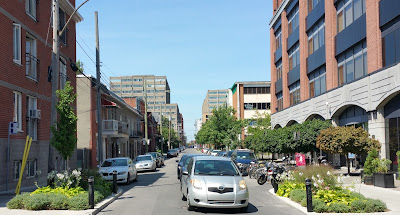I
recently spent a few days in Montreal and came back with a number of
observations and ideas that Vancouver might want to consider. Here are seven,
in no particular order.
 This small Montreal infill
housing development offers affordable housing choices not found in Vancouver.
Photo Michael Geller
This small Montreal infill
housing development offers affordable housing choices not found in Vancouver.
Photo Michael Geller
1.
Alternative forms of affordable housing
One of
Montreal’s traditional housing forms is the maisonette, which offers one and
two-level suites above a single level suite, with direct access from a winding
outdoor staircase.
While
Montreal snows more than Vancouver, I was surprised to discover this affordable
housing form continues to be built, appealing to those who cannot afford a house
or townhouse, or prefer not living in an apartment building.
In other
Canadian cities, the stacked-townhouse is a variation on this housing form.
While some stacked-townhouse developments are now being built in Vancouver,
they need to be more common.
I also
discovered small eight- to 12-unit infill developments around the city. They
offer grade level townhouses with their own garages, and smaller suites above
accessed from the street. Upper floor residents do not have off-street parking
and must rely on street parking, car-share, or do without a car. As an
increasing number of Vancouver residents no longer need to own a car, similar
infill developments would fit well in Vancouver.
2. Electric
taxis
While
Vancouver is rightly proud of its many hybrid taxis, I was surprised to
discover one Montreal taxi operator offers a small fleet of Teslas. Now that’s
one-upmanship.
Last
week, many Vancouverites were delighted by the first annual Vancouver Mural
Festival, which took place in Mount Pleasant. Montreal has been organizing
similar festivals since 2013. It also offers the annual winter Montreal en
Lumiere, which illuminates murals on downtown buildings. Some continue year-round,
and I was delighted to see illuminated murals transforming a grey-concrete
structure at the University of Quebec. Many of Vancouver’s building facades
could serve as nightly canvases.
4. A city
of bikes
While
Vancouver drivers complain about the number of bikes and bike lanes being built
around our city, there seemed to be far more bicycles on Montreal’s downtown
neighbourhood streets. Like Vancouver, the city has set up electronic monitors
to count the number of cyclists using separated bike lanes.
While I
am on the topic, I noticed that much-needed new bike lanes have been added
along both sides of Southwest Marine Drive, between Granville Street and
Dunbar. However, did the engineers really have to install sporadic concrete
barricades and flimsy white poles? I think they look awful and question the
need.
5. Slower
and more respectful drivers
While
Montrealers always had a reputation of disregarding traffic regulations, I was
surprised to discover far more motorists driving at the posted speed limit
compared to Vancouver. Drivers also tended to stay in the inside lane, except
to pass, something Vancouver drivers rarely do. While others may not share my
experience, at a time when ICBC rates are climbing due to an increased number
of accidents, perhaps it is time for Vancouver motorists to obey speed limits,
signalization, and driving in the proper lanes.
Alternatively,
maybe it is time for the province to introduce mandatory driving tests every
five or 10 years, before renewing drivers’ licenses.
6.
Attractive street planting
Wandering
around downtown neighbourhoods, I was impressed by many new street planting
installations. While it was not evident whether they were funded by the city or
neighbourhood improvement associations, they certainly enhanced the city.
Sadly, while attractive street plantings can be found in many other cities and
metro municipalities, this does not seem to be a priority for Vancouver.
 Vancouver could use at least one more Jewish deli
like Montreal's famous Schwartz's. Photo Michael Geller
Vancouver could use at least one more Jewish deli
like Montreal's famous Schwartz's. Photo Michael Geller
7. Jewish
delicatessens
For many,
myself included, no visit to Montreal is complete without a visit to Schwartz’s
or one of the city’s other Jewish delicatessens for a bagel and lox or smoked
beef sandwich. While we now have a branch of Montreal’s Dunns, as well as
Ominitsky’s on Oak Street, and the recent pop-up Mensch Delicatessen on East
Broadway (that serves a hearty pastrami sandwich), Vancouver desperately needs
another traditional Jewish deli. After all, you don’t have to be Jewish to
enjoy good Jewish deli.
While
there are many things that Vancouver could teach Montreal, including how to
better deter graffiti, hopefully some of these ideas will find a place in
Vancouver in years to come.
michaelarthurgeller@gmail.com
- See
more at:
http://www.vancourier.com/opinion/seven-things-vancouver-should-copy-from-montreal-1.2332822#sthash.zO2UfNOH.dpuf






















